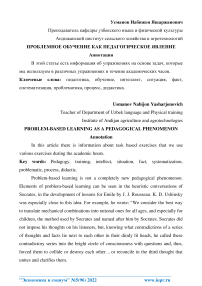Problem-based learning as a pedagogical phenomenon
Автор: Usmanov N.Ya.
Журнал: Экономика и социум @ekonomika-socium
Рубрика: Основной раздел
Статья в выпуске: 5-2 (96), 2022 года.
Бесплатный доступ
In this article there is information about task based exercises that we use various exercises during the academic hours.
Pedagogy, training, intellect, situation, fact, systematization, problematic, process, didactic
Короткий адрес: https://sciup.org/140298743
IDR: 140298743
Текст научной статьи Problem-based learning as a pedagogical phenomenon
Problem-based learning is not a completely new pedagogical phenomenon. Elements of problem-based learning can be seen in the heuristic conversations of Socrates, in the development of lessons for Emile by J. J. Rousseau. K. D. Ushinsky was especially close to this idea. For example, he wrote: “We consider the best way to translate mechanical combinations into rational ones for all ages, and especially for children, the method used by Socrates and named after him by Socrates. Socrates did not impose his thoughts on his listeners, but, knowing what contradictions of a series of thoughts and facts lie next to each other in their dimly lit heads, he called these contradictory series into the bright circle of consciousness with questions and, thus, forced them to collide or destroy each other. , or reconcile in the third thought that unites and clarifies them.
The history of problem-based learning proper begins with the introduction of the so-called research method, many of whose rules in bourgeois pedagogy were developed by John Dewey.
Deep research in the field of problem-based learning began in the 60s. The idea and principles of problem-based learning in line with the study of the psychology of thinking were developed by Soviet psychologists S.L. Rubinshtein, D.N. Bogoyavlensky, N.A. Menchinskaya, A.M. Danilov, M. N. Skatkin. T. V. Kudryavtsev, D. V. Vilkeev, Yu. K. Babansky, M. I. Makhmutov, and I. Ya. Lerner dealt with these issues a lot. Research in this area is now being carried out by other representatives of pedagogical science.
The task of the school is the formation of a harmoniously developed personality. In modern pedagogy, questions of the general development of children in the learning process are investigated. The most important indicator of a comprehensively and harmoniously developed personality is the presence of a high level of mental abilities.
Developing education, that is, leading to general and special development, can only be considered such training in which the teacher, relying on knowledge of the patterns of development of thinking, with special pedagogical means, conducts purposeful work on the formation of the mental abilities of his students in the process of studying the basics of science. This kind of learning is problematic.
Problem-based learning arose as a result of the achievements of advanced practice and theory of education and upbringing, in combination with the traditional type of education, is an effective means of general and intellectual development of students.
In the pedagogical literature there are a number of attempts to define this phenomenon.
By problem-based learning, V. Okon understands “a set of such actions as organizing problem situations, formulating problems, providing students with the necessary assistance in solving problems, checking these solutions, and, finally, managing the process of systematizing and consolidating the acquired knowledge”1.
-
D. V. Vilkeev, by problem-based learning, means such a nature of learning when it is given some features of scientific knowledge.
I. Ya. Lerner sees the essence of problem-based learning in the fact that “a student, under the guidance of a teacher, takes part in solving new cognitive and practical problems in a definitely system that corresponds to the educational goals of the school”2.
-
T. V. Kudryavtsev sees the essence of the process of problem-based learning in the presentation of didactic problems to students, in their solution and in the mastery of generalized knowledge and principles of problem tasks by students. Such an understanding is also found in the works of Yu. K.Babansky.
Sum up , based on the generalization of practice and analysis of the results of theoretical studies, M. I. Makhmudov gives the following definition of the concept of "problem learning": built taking into account goal-setting and the principle of problematicity; the process of interaction between teaching and learning is focused on the formation of students' cognitive independence, the stability of learning motives and mental (including creative) abilities in the course of mastering scientific concepts and methods of activity, determined by a system of problem situations.
The list of used literatures
-
1. Богоявленский Д. Н., Менчинская Н. А. Психология усвоения знаний в школе.-М.,1959.
-
2. Гальперин П.Я. Методы обучения и умственное развитие ребенка. - М.: Изд-во МГУ, 1985.
-
3. Крутецкий В.А.Основы педагогической психологии. М.:Просвещение, 1972.
-
4. Крутецкий В.А. Психология обучения и воспитания учащиеся. - М., 1976.
"Экономика и социум" №5(96) 2022
Список литературы Problem-based learning as a pedagogical phenomenon
- Богоявленский Д. Н., Менчинская Н. А. Психология усвоения знаний в школе.-М.,1959.
- Гальперин П.Я. Методы обучения и умственное развитие ребенка. - М.: Изд-во МГУ, 1985.
- Крутецкий В.А.Основы педагогической психологии. М.:Просвещение, 1972.
- Крутецкий В.А. Психология обучения и воспитания учащиеся. - М., 1976.


